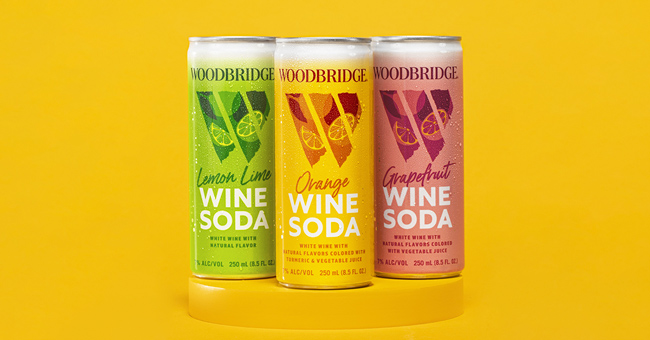Under its Woodbridge Winery Holding, Constellation Brands is dipping yet another toe into the RTD cocktail set, this time with wine sodas.
The “first-of-its-kind wine experience,” as Woodbridge’s communications team calls it, will launch nationwide this month on Drizly, InstaCart and at retailers where Woodbridge products are sold. The drink, made with soda and Woodbridge white wine, contains 7% ABV in each 8.5 oz. can and will be available in three flavors: Lemon Lime, Orange and Grapefruit. The variety 6-pack of 250ml cans has a suggested retail price of $10.99-$12.99.
“We at Woodbridge want to liberate drinkers to ‘Wine Your Way’ – to enjoy whenever, wherever, and however you want,” said Serena Shrivastava, aWoodbridge brand VP, in a press release. “We know many drinkers want something other than traditional varietal wines, which inspired us to create Woodbridge Wine Sodas to provide consumers with a new way to experience and enjoy wine that is less formal and more fun.”
Wine soda is not the brand’s first venture into the ready-to-drink alcoholic beverage set. Previously, Woodbridge released a line of wine-based seltzers to compete in the ever-growing hard seltzer category. Hard seltzer has since slowed a bit, while RTD Cocktails are on the rise, up 53% in the past year, according to IWSR. Woodbridge decided to move away from the seltzer experience in favor of addressing consumer interest in the wine RTD space to fill “a white space in the industry as an accessible and non-intimidating alcoholic beverage,” the brand told BevNET in an email.
“It’s not just consumers who benefit from interesting and innovative RTD products, so too do global drink companies. More than any other category, RTDs have truly captured and leveraged the trend of convergence in the beverage industry,” said IWSR COO of the Americas, Brandt Rand, in a report. “Many well-known brands, from water to energy drinks to coffee, have recently crossed over into alcoholic RTDs, leading to a number of strategic partnerships between soft drinks, beer, and spirits companies in order to successfully leverage distribution across multiple outlets.”
Throughout the past year, many brands have entered the RTD cocktail category to diversify their product portfolios and address changing consumer tastes. In February, Coca-Cola announced that it had partnered with Brown-Forman to launch Jack Daniel’s & Coca-Cola RTD in Mexico. The beverage giant’s other RTD partnerships include: Topo Chico Hard Seltzer and Simply Spiked Lemonade with Molson Coors and Fresca Mixed with Constellation Brands. As well, Boston Beer teamed up with PepsiCo to debut Hard MTN Dew in Florida, Iowa and Tennessee.
Although IWSR defines seven sub-categories of ready-to-drink products (cocktails/long drinks, hard seltzers, hard coffees, hard teas, hard kombuchas, wine spritzers/coolers and flavored alcoholic beverages), the lines between these categories continue to blur. “Diversification also better positions alcohol categories to address changing consumer tastes and the blurring of lines between traditional soft drinks and alcohol, or alcohol-adjacent products,” Rand said in an IWSR report.
Over the past several years, ready-to-drink cocktails have gained significant traction, topping all other major drinks categories. The IWSR forecasts a +15% CAGR from 2020 to 2025 for RTDs across 10 beverage markets, compared to +1% CAGR for total beverage alcohol during the same time period.
“RTDs are still growing at higher rates than spirits, wine, and beer, signaling a major shift in consumer interest in the category across all demographics,” said Rand. “We’re also seeing a significant premiumisation trend in RTDs as more and more new brands enter the space.”

